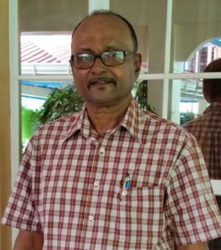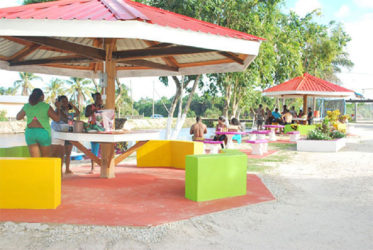Chastened by the relatively sudden disappearance of the economic windfall that had been triggered by the PetroCaribe oil for rice deal, the business community on the Essequibo Coast is still seeking to find its feet in a changed economic environment where the loss of a 200,000-tonne rice market has created deep uncertainty for the industry.
Essequibo farmers may have a direct reason for bemoaning the altered fortunes of rice, but the ripples have spread way beyond the rice sector and permeated into the business community as a whole. It may not be accurate to say that Essequibo is ready to have a requiem for rice, but there is evidence of a modest, discernable measure of diversification, with the prospect of a revival of the coconut industry seemingly generating a healthy measure of enthusiasm, if not – at least as yet – an actual response on the ground.
President of the Essequibo Chamber of Commerce Deleep Singh told Stabroek Business however, that the loss of the Venezuelan rice market appears to have finally chastened the business community, and that there has been a coming to terms with the reality that there is now no other option but to seek a way forward.

The April 7 to 8 inaugural Agro and Trade Expo being staged under the auspices of the Chamber, marks the first collective response of the business community to the challenge that it faces now. Singh said the Chamber is seeking to mobilize every facet of business. It intends to place a spotlight on Essequibo as a focal point for the promotion of trade and commerce.

‘fowl cock’ Ramotar
“Through this expo we are hoping to raise the profile. We will be seeking to promote our potential and create avenues and networks that will stimulate an environment of producers and markets for the Essequibo business community,” Singh said.
Singh conceded that the organizers of the event are only too aware that its success hinges on promoting the event way beyond the confines of Region Two. The idea is to attract participation from the wider national business community, and in that regard, invitations have already been issued.
The event, Singh stated, has already set itself the objective of sending a message to the country as a whole, not only that its faith in the rice industry remains undiminished, but that there is life beyond the end of the PetroCaribe rice deal.
Other crops have made inroads into the region’s agricultural sector, and next month’s expo is hoping to bring to national attention, the prospects of the wider agricultural sector including the fast-rising prospects of the coconut industry and the potential of citrus, dairy products and light manufacturing. Tourism, too, is being touted as a potentially lucrative niche investment for the region.
The changing fortunes of rice have also triggered a local interest in the commodity’s value-added potential.
It is understood that it will take significant measures of both financial investment and technology for the region to arrive at a point, where it can begin to produce at least some of the wide variety of value-added products which include rice husks, rice bran oil, rice flour, rice milk, rice puddings, rice starch and rice paper.

If much of this is futuristic thinking, then for now, the Essequibo Chamber president is hoping that next month’s expo will serve as a catalyst for refocusing business thinking and re-directing investment orientation in the region. However, he was keen to make the point, that rather than give up on rice production, both farmers and millers are moving to enhance the marketability of their product through re-packaging initiatives and more aggressive marketing. Beyond that, Singh observed, rice farmers are now more focused on intercropping.
With some prominent Essequibo businessmen already having made significant investments in the coconut sector, Singh added that the move is likely to see an enhanced level of cooperation between the region’s business community and state-run technical support institutions, like the National Agricultural Research and Extension Institute.
The chamber is targeting a participation level which the president hopes will see at least 160 vendors from the various sectors, including agriculture, agro processing, forestry, mining, banking and finance (including the Institute of Private Enterprise Development and the Small Business Bureau), participating in the event.
If next month’s event is not an instant game changer, Singh believes it is a start upon which Essequibo can build.




